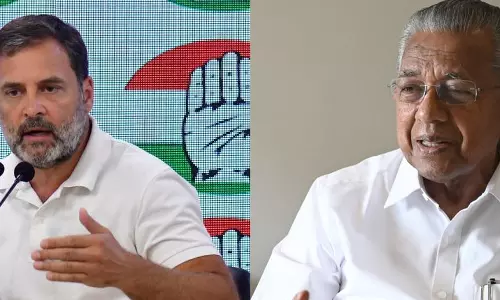
Draconian laws coming again
text_fieldsImage only for representation
Minister of State for Home Affairs Ajay Misra has introduced the Criminal Procedure (Identification) Bill 2022 in the Lok Sabha, repealing the Identification of Prisoners Act, which has been in force in British India since 1920. The bill, which received 120 votes for and 58 against, authorizes police and prison authorities to collect fingerprints, palm prints, footprints, photographs and biological samples of anyone arrested with or without reason. Now irrespective of whether it will be debated in detail in both the houses or not, it is certain to be passed by a huge majority, and then will soon become law with the assent of the President. The Centre claims that the existing law, which was enacted a century ago when only primitive methods of proving guilt existed, has become outdated and that the aim of the bill is to make criminal investigation and prosecution more dynamic and scientific employing the latest technology. This may seem a plausible contention. But all this would apply only if police, investigative agencies and prison authorities in the country show the diligence to ensure that criminal investigation and collection of evidence are honest and fair and not influenced by prejudice. The new bill provides that this power should be exercised by one not below the rank of Head Constable or the Head Warden with the approval of the magistrate.
Ours is a country where thousands of innocent people are arrested under charges prompted by lure of money, political pressure or personal prejudice or under pure suspicion and forced to live for indefinite periods in jail with even bail being denied to them. Unfortunately, not a small number of them are forced to spend ten or twelve years of trial and then finally acquitted. Those who are so released from prison after spending their entire youth in prisons will have nothing to do in life other than biding the rest of their time to suffer the punishment of existence. In such an environment, recording everything from biological sample to all that seem appropriate to the authorities would be seen as a ploy to hunt down the innocent again. It is true that the bill provides for deleting all bio-samples from the records if an accused is released from jail or acquitted by the court.. But that deletion of traces will happen only if the investigation, trial and judgement are fair, honest and unbiased. In a system without provision or scientific means, not to speak of humaneness, for verifying if the records have been destroyed or not, mere insertion of this provision in the books does not carry much relevance. On the other hand, the bill stipulates that a magistrate can require a person arrested for any offence to provide a sample. If the accused refuses to do so, it will be punishable under Section 186 of IPC. With such a Damocles' sword hanging above the head, no one would venture to refuse it. Given the current state of affairs where arresting any one disagreeing with the government's policies or protesting against unjust laws has become a pastime of the ruling establishment, the bill under Parliament's consideration is highly likely to be misused.
It is probably recognizing such risks that the Opposition opposed the bill, citing its unfairness. While Congress MP Manish Tiwari pointed out that Parliament does not have the power to pass such a legislation which is contrary to Articles 20 and 21 of the Constitution, RSP's NK Premachandran argued that the bill was unconstitutional and a violation of human rights. Congress Lok Sabha Chief Whip Kodikunnil Suresh also said that the bill, which confers excessive powers on the police, will allow the rulers of the day to encroach on fundamental rights. Although many opposition leaders, including Congress' Adhir Ranjan Chowdhury and TMC's Saugata Roy, came out against the bill, the central government, on the back of its brute majority, has decided to take the route of the deep state. Even as statistics prove that Dalits and Muslims have a presence far beyond their population ratio in India's prisons, and given the fact that a large percentage of them are mere unde-rtrials, more and more of such human rights abuses, which militate against the essence of the Constitution, are to be expected.























